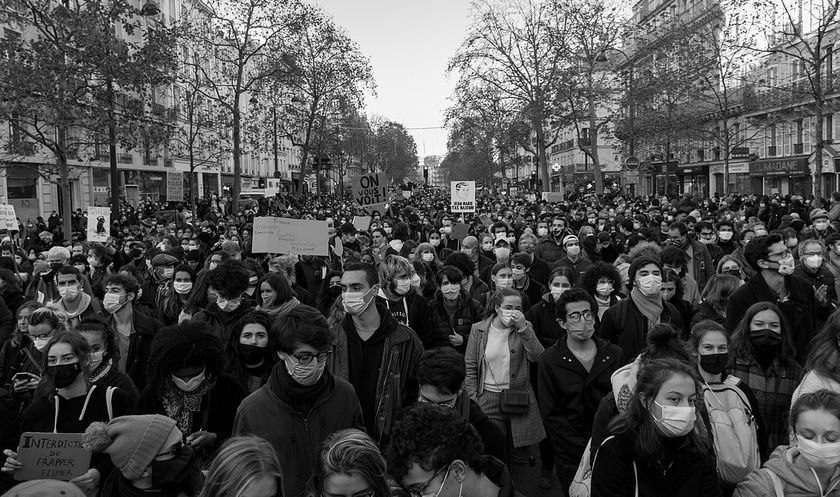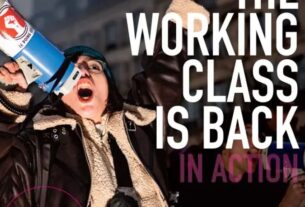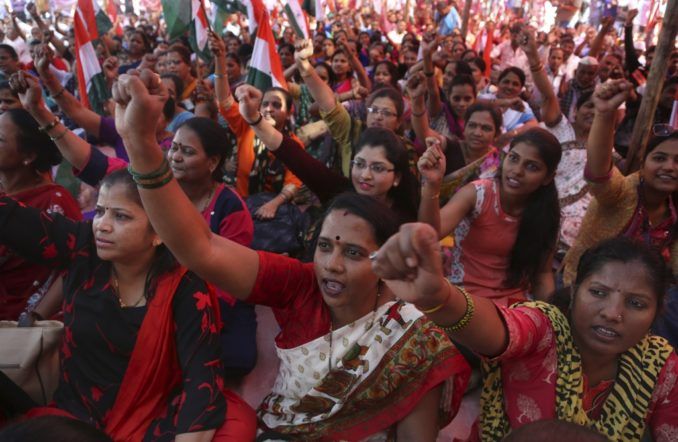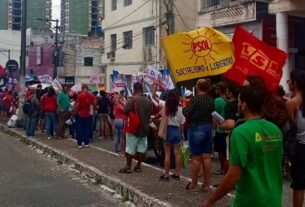Nicolas Croes is a member of Linkse Socialistiche Partij / Parti Socialiste de Lutte (ISA in Belgium).
Last Saturday 12 December, for the third consecutive week, thousands of people marched in various French cities to denounce the Global Security Bill and the separatism bill. In the midst of the pandemic, the priorities of President Macron’s government are to strengthen the repressive arsenal of the state and to try to divide the population on a racist basis.
This draft law clearly aims to limit the freedom of the press, expression and demonstration, in particular its article 24, which penalises the ‘malicious dissemination’ of images of law enforcement officials. It provides for a one-year prison sentence and a 45,000 euro fine for the dissemination of “facial images or any other element of identification” of law enforcement officers in intervention when it “damages” their “physical or psychological integrity”. As the left party La France Insoumise denounced, this is “a massive deterrent to go and demonstrate and to film what happens during demonstrations”.
The approach of the government and its allies in the face of police violence is clear: to hide it and not to fight it. But while the law was being discussed in the National Assembly (where it was adopted on 24 November), a series of events turned the affair into a real fiasco.
On the evening of Monday 23 November, hundreds of migrants joined by activists from different associations, elected representatives and militants of left-wing parties were brutally chased away by the police from the Place de la République in Paris, using truncheons and tear gas. Among the shocking images were those of a policeman tripping a man who was trying to flee. A few days later, on 26 November, images of the beating of a black man, Michel Zecler, were released. The victim had initially been held for two days in police custody on charges of “violence against persons exercising public authority” and “rebellion”, before the investigation was closed thanks to the video footage of the events. Without it, he would most certainly be in prison.
There are a lot of comparisons with the explosion of the Black Lives Matter movement following the murder of George Floyd in the United States. On Saturday 28 November 500.000 people demonstrated in the country in response to the call of numerous journalists’ organisations, trade unions and various associations united in the “coordination #StopLoiSécuritéGlobale” (Coordination to stop the global security law).
Under pressure of this impressive mobilisation, especially in this period of severe confinement in France, the government announced, two days later, the “total rewriting” of Article 24, the most controversial part of the security law. This clearly shows panic in the government, since the text had already been voted in the National Assembly and is now in the hands of the Senate, where the issue should be decided in January. The coordination rightly calls for the bill to be withdrawn altogether.
The mobilisations continued on Saturday 5 December: nearly 90 rallies were announced across the country. The first Saturday in December is traditionally a day of mobilisation at the initiative of the CGT union to protest against precariousness. The struggle against police violence and the Global Security Law was of course linked to this year’s protests. As if to throw a little more oil on the fire, a day earlier the government announced three decrees widening the possibilities of keeping and developing files on the population.
Repressive arsenal and social resistance
The Global Security Bill is part of a deeper context. Legislation or procedures aimed at stifling or intimidating protest are multiplying in France, especially since 2016 and the challenge to the Labour Law under the presidency of François Hollande (PS), then with the Yellow Vests movement in 2018 under Macron’s presidency, and finally the demonstrations against the pension reform in December and January 2019–20. Thus, on 3 December, a member of the collective “Désarmons-les” (which documents police violence) was sentenced to 8 months in prison following his arrest by police officers during a Yellow Vests protest in September 2019. He was accused in particular of having struck a blow at a police shield during his arrest.
At the same time, police violence during demonstrations has become the norm. These have a dual purpose. Firstly, to intimidate the demonstrators and to send out the message that even if one stands aside from the confrontation, one can be seriously injured and targeted by the firing of weapons. Among the victims of police repression is Zineb Redouane, an 80-year-old woman from Marseille who died on 2 December 2018 after being wounded in the face by a tear gas grenade while closing the shutters of her flat… located on the 4th floor!
Secondly, the authorities are trying to divide the movement on the basis of reactions to police violence, with the help of the dominant media, which is doing everything it can to magnify the incidents on the fringes of the demonstrations to present its participants as a bunch of thugs. This strategy of violence is very conscious on the part of the authorities.
Police violence and systemic racism
Police violence has already for a long time affected working-class neighbourhoods. It is no coincidence that when the Black Lives Matter movement took off again last spring, it particularly found a resonance in France. In front of the Paris Court, the committee “The Truth for Adama” had succeeded in gathering several tens of thousands of demonstrators despite a ban on gathering. Alongside George Floyd were the names of Adama Traoré (who died during an arrest in the Val d’Oise), Lamine Dieng (who had died in a police van in Paris), Amadou Koumé (who had died in a police station in Paris). It is not uncommon for young men to die as a result of police intervention in suspicious circumstances and for their relatives to launch committees and fight long battles for justice.
Last July, the independent online media website “Basta!” revealed that in 43 years, out of 213 lethal interventions involving the police, only ten officers have been sentenced to prison for homicide. The last conviction dates back to 1999. A StreetPress analysis shows that between 2007 and 2017, 47 unarmed men died as a result of law enforcement interventions. None of the police or gendarmes involved ended up in prison. More than a third of the proceedings resulted in a dismissal of the case or acquittal of the officers. The majority of cases are still pending.
The plan against separatism
The desire to silence social resistance is coupled with the stigmatisation of Muslims. This is strengthened in the run up to important elections: first regional and departmental (in March 2021), but above all presidential and legislative (in 2022). It is with this in mind that the government was reshuffled last summer, a reshuffle that was clearly right-wing and aimed at preserving a base of right-wing voters in a political context marked by profound instability.
When he took office, the new Minister of the Interior, Gérald Darmanin, who is also the subject of a rape complaint, did not hesitate to deny police violence in France, saying: “When I hear the word ‘police violence’, I personally choke.” A very shocking expression a few weeks after the murder of George Floyd and when a delivery man, Cédric Chouviat, died in January after being tackled to the ground by the police and repeatedly shouting ”I’m choking”.
On 2 October, Macron’s “plan against separatism” was presented, a bill against political and radical Islam. The bill will be debated in Parliament in early 2021. It would further extend the ban on religious signs and practices in public sector workplaces. The idea was very clearly to use the emotion linked to the opening of the trial of the Charlie Hebdo attacks. This was the context behind the assassination of Samuel Paty on 16 October and the attack on a church in the city of Nice which claimed 3 victims on 29 October.
Christian Estrosi, the mayor of Nice (Les Républicains), immediately declared that he wished to “modify the Constitution” in order to be able to “wage war” against an ideology that he described as “Islamo-fascism”. Eric Ciotti, deputy of the same right-wing party, called for the creation of “a French-style Guantanamo”. The Minister of Education Jean-Michel Blanquer denounced on 22 October “Islamo-gauchism” which, according to him, “wreaks havoc at the universities”. An amendment then adopted by the Senate stipulates that university research should henceforth ”express itself within the framework of the values of the Republic”, an ambiguous formulation aimed at research limiting itself to what is wanted by the establishment.
This climate will obviously give confidence to the extreme right, including its most radical fringes. A few hours after the Nice attack, a young man linked to the extreme right-wing group Génération Identitaire was shot dead by the police after threatening North Africans with a gun. On the other hand, on 14 November, in Cholet, a man took to the streets “guided by God to act”, seriously injured his wife and killed two people. The national media ignored the case and the local press was careful not to talk about a terrorist attack. But this time the murderer who wanted to punish the unbelievers was Catholic.
The labour movement must take the initiative
On the eve of the mobilisations against the Global Security Law, a poll by the Ifop Institute revealed that 85% of French people expect a social explosion in the coming months in the country. That’s 13 points more than the last poll in January 2020, when the movement against pension reform was at a high point.
The current mobilization is mainly led by journalists and human rights associations and has met with a particular support among the youth. But it is clear that the repressive measures are mainly aimed against workers in the first place. The social ravages of the economic crisis are still in their early stages — and 700,000 jobs have already been destroyed in France in the first six months of 2020. The strengthening of the police and the repressive arsenal will soon target those who are fighting in their workplaces.
The labour movement must clearly place its mark on the social protest, and not hesitate to resort to its most effective weapon: that of the strike. Police violence, criminal failures in health care and care for the elderly, precariousness, systemic racism. There is no shortage of reasons to be angry and they must be brought together around a program that responds to social needs and the crisis in the system. This is also the best way to fight against the extreme right and fundamentalists of all kinds.
But it is also necessary to develop a political alternative. At the end of October, a poll by Le Figoro with an electoral protest indicator, indicated that 79% of voters are seriously thinking about an anti-systemic vote in 2022. Seizing this potential requires organising anger with the labour movement by defending a program that fights austerity and racism through solidarity. The candidacy of Jean-Luc Mélenchon which has just been announced for the presidential elections could play a role in this. His campaign needs an offensive program. The one defended by La France Insoumise in 2017 was an excellent attempt to stress the need for ecological planning and the nationalisation of certain parts of the economy. But the challenges posed by the current economic crisis, the worst since the 1930s, the health crisis and the ecological crisis leave no choice but to go further and defend the rejection of capitalism.
Both in the streets and at the ballot box, the capitalist system as such must be attacked in a campaign to popularize a system based on the satisfaction of social needs and not on the thirst for profit: a democratically planned socialist society.




